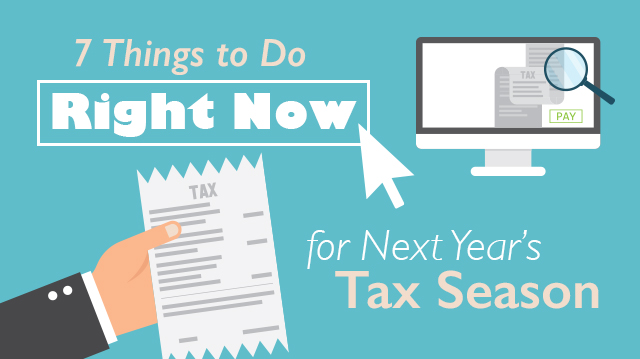7 Things To Do Right Now For Next Year’s Tax Season

If applicable, track your mileage! For this tax year, 2016, the IRS has announced that the standard mileage rate for business will be 54 cents per mile. (That’s down 3.5 cents from the 2015 rate of 57.5 cents.) The IRS calculates this rate “based on an annual study of the fixed and variable costs of operating an automobile.” According to MileIQ, one of the biggest mistakes that taxpayers make is not keeping track of their business mileage in real time. At the end of the year, it’s a lot harder to go back and recreate your car trips in an accurate way, so keeping a notebook ledger in the car is prudent. Remember, the IRS wants odometer readings at the beginning and the end of the year, as well as the date, number of miles and purpose of the business trip. Figure out a plan for your receipts and paperwork. Come tax time, if you’re anything like the average American, your receipts and paperwork are strewn all over your office and kitchen, some in a shoebox, and some still in your car. Building an efficient system now is essential to making sure there are no oversights come 2017. Is paperwork not your thing? The IRS now accepts electronic proof of receipts, as long as they are fully legible and verifiable. Consider investing in a neat scanner, which can help cut down on clutter and physical papers filing up. Bonus: neat also offers tax report creation features within some of their software.
Go directly to the source. In preparation for next year, spend some time scrolling through the IRS website, which offers a number of FAQs, forms, and information on payments, refunds, and the latest, most accurate explanations of year-to-year tax changes. Checking it periodically keeps consumers up-to-date on changes, announcements and IRS initiatives that might be of interest to Americans who are still catching up on past years’ returns.
Plan your retirement saving strategy. Take a survey of what retirement plans will be tax-deductible and most beneficial to you in the long run. If you’re a full-time employee, be clear on how much you are allowed to contribute to a 401(k) each calendar year as well as what your employer will match. If you’re a freelancer or small business owner, evaluate which IRA plan might be best for you. In the long term, there is a big difference between saving in a Roth IRA vs. a traditional IRA, so learning the ins and outs of both will be beneficial. Thinking about it early means more time to plan for incremental contributions throughout the year.
Be clear on how your health insurance plan affects your taxes. In the era of healthcare reform, TurboTax reminds us that “all Americans will be required to maintain health insurance.” The IRS will be the supervisory body, requiring taxpayers to log the value of their insurance plan on their taxes. According to Forbes, at the end of the tax year, “If you do not have coverage…you will need to fill out a form 8965. You will use this to determine if you are eligible for an exemption from the coverage requirement or to figure out the penalty you owe.” Contact your employer or your health insurance provider to be sure you are meeting the minimum coverage.
Treat the deadlines as deadlines. The IRS considers April 15 (or the business day following) as a serious deadline. While you may be able to file for an extension for the full tax return through form 4868, you will need to estimate how much you owe by that date and make that estimated payment by then. With that said, there may be other deadlines you need to abide by, depending on your tax situation. For example, if you are self-employed, you may be required to pay quarterly taxes; of course, this means that you must be on top of your earnings and estimated taxes throughout the entirety of the year—not just during tax season.
—Brett Murphy Hunt
No comments:
Post a Comment